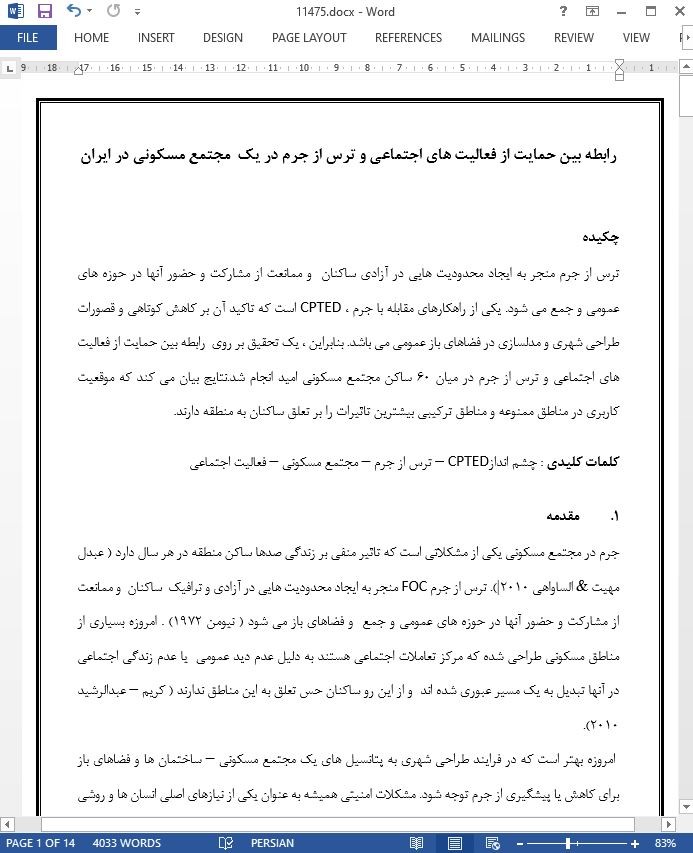
رابطه بین حمایت از فعالیت های اجتماعی و ترس از جرم در یک مجتمع مسکونی در ایران
چکیده
ترس از جرم منجر به ایجاد محدودیت هایی در آزادی ساکنان و ممانعت از مشارکت و حضور آنها در حوزه های عمومی و جمع می شود. یکی از راهکارهای مقابله با جرم ، CPTED است که تاکید آن بر کاهش کوتاهی و قصورات طراحی شهری و مدلسازی در فضاهای باز عمومی می باشد. بنابراین ، یک تحقیق بر روی رابطه بین حمایت از فعالیت های اجتماعی و ترس از جرم در میان 60 ساکن مجتمع مسکونی امید انجام شد.نتایج بیان می کند که موقعیت کاربری در مناطق ممنوعه و مناطق ترکیبی بیشترین تاثیرات را بر تعلق ساکنان به منطقه دارند.
1. مقدمه
جرم در مجتمع مسکونی یکی از مشکلاتی است که تاثیر منفی بر زندگی صدها ساکن منطقه در هر سال دارد ( عبدل مهیت & الساواهی 2010|). ترس از جرم FOC منجر به ایجاد محدودیت هایی در آزادی و ترافیک ساکنان و ممانعت از مشارکت و حضور آنها در حوزه های عمومی و جمع و فضاهای باز می شود ( نیومن 1972) . امروزه بسیاری از مناطق مسکونی طراحی شده که مرکز تعاملات اجتماعی هستند به دلیل عدم دید عمومی یا عدم زندگی اجتماعی در آنها تبدیل به یک مسیر عبوری شده اند و از این رو ساکنان حس تعلق به این مناطق ندارند ( کریم – عبدالرشید 2010).
5. نتیجه گیری
نتایج این تحقیق نشان داد که فعالیت های اجتماعی حمایت شده یکی از ابعاد CPTED است که افزایش امنیت ساکنان را به همراه می آورد. نتیجه های اصلی به دست آمده از این تحقیق را می توان به صورت زیر بیان کرد :
برای افزایش امنیت ساکنان ، اولین موضوعی که باید در نظر گرفته شود مربوط به یافتن بهترین موقعیت برای یک کاربری در مجتمع مسکونی است. سپس ، می توانیم نوع کاربری را برای فضاهای قرق شده اختصاص دهیم و نوع فعالیت های آنها راتعیین کنیم. همچنین ، می توانیم کاربری های مختلف را با یکدیگر ترکیب کنیم. برای مثال ، یک کتابخانه یا باشگاه را در پارک قرار دهیم تا مقدار جرایم کاهش یابد
Abstract
Fear of crimes has been led to restrictions on freedom residents and prevented them from participating in the public domain. One of the strategies to overcome the crime is (CPTED) which emphasizes on decreasing delinquencies by urban design and through modelling it's principles in public open spaces. Therefore, a survey on the perception of the Relationship between Support of Social Activities and Fear of Crime among 60 residents in Omid Residential Complex was conducted. The results found that the usage location, providing usage in the abandoned spaces and usage combination, have the highest impact on the residents’ place attachment, respectively.
1. Introduction
Crime in residential Complex has been a social problem that has an improper influence on the life of thousands of residents every year (Abdul Mohit & Elsawahli, 2010). Fear of crimes (FOC) has been led to restrictions on freedom of traffic of residents and prevented them from attending and participating in the public domain and the open spaces (Newman, 1972). Nowadays, most of the designed residential areas which were the center of social interaction due to the lack of public oversight have become the merely passing way or lack of social life spaces which residents do not have a sense of belonging in these spaces (Karim & Abdul Rashid, 2010).
5. Conclusion
The results of the research showed that Support activity is one of the CPTED dimensions for increasing resident's security. The main conclusions are as follows:
- For increasing residents' security, the first concentration has to be on finding the best location for a usage in the residential complex. Then we allocate the usages for abandoned spaces and create activity in them. Also, we can combine different usages with each other. For example put a library or gym in a park can easily reduce the criminal opportunities.
چکیده
1. مقدمه
2. مرور ادبیات
2.1 ابعاد CPTED و قربانی شدن
2.2 فرضیه ها
3. روش تحقیق
4. نتایج و بحث
5. نتیجه گیری
Abstract
1. Introduction
2. Literature Review
2.1. CPTED dimensions and victimization
2.2. Hypotheses
3. Methodology
4. Results and Discussion
5. Conclusion
- اصل مقاله انگلیسی با فرمت ورد (word) با قابلیت ویرایش
- ترجمه فارسی مقاله با فرمت ورد (word) با قابلیت ویرایش، بدون آرم سایت ای ترجمه
- ترجمه فارسی مقاله با فرمت pdf، بدون آرم سایت ای ترجمه



